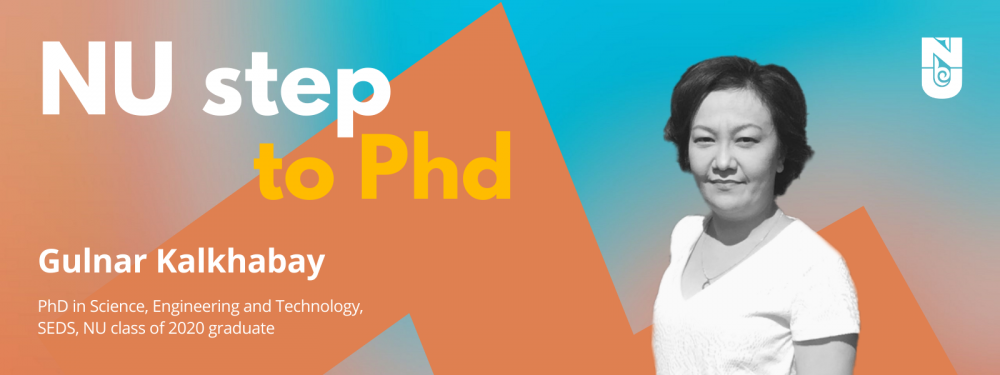Nickel nanotubes with a wide range of applications – research by NU PhD program graduate
Today’s interviewee is Gulnar Kalkhabay, who studied for her PhD at the NU School of Engineering and Digital Sciences and successfully defended her dissertation in August 2020. Today, Gulnar works in the Nur-Sultan branch of the Institute of Nuclear Physics.
- What was the topic of your dissertation work?
The topic of my dissertation is “Production and properties of nickel nanotubes synthesized by electrochemical deposition into template matrices”. Nickel nanotubes can potentially be used in microelectronics, photocatalysis, the chemical industry, and biomedicine. For example, they can be used as magnetic carriers for targeted drug delivery. In terms of research in this direction, we have obtained early results about the possibility of coating silicon nanotubes with organic compounds to increase the effectiveness of corrosion protection and to create additional chemical bonds for binding drugs.
Another possible development of our research and its potential application is the use of nanotubes as a base for catalysts or photocatalysts to enhance the decomposition of organic dyes. Based on the results of the research, we have published several articles in international journals. At the Institute of Nuclear Physics (INP), we received a grant for the research of nickel nanotubes.
- Whose help was valuable to you in the process of working on your dissertation?
I would like to express my sincere gratitude to everyone who helped me during the work on my dissertation. First of all, that is my supervisor Professor Alexander Tikhonov. Professor Tikhonov is a global specialist in the field of nanotechnology and materials science, who received a PhD in the United States. During the experiments and writing the articles, his help was invaluable, he gave advice on how to write articles for international journals and helped to properly formalize the results of experiments.
I am grateful to Dr. Artem Kozlovsky, my scientific consultant, for giving me the opportunity to work in the laboratory of the INP, and for sharing his knowledge in the field of experimental physics, always taking the time to read and correct my work. And of course, to my external supervisor, Dr. Maxim Zdorovets, for the support and the opportunity to work in the INP laboratory.
I would also like to express my deep gratitude to Professor Luis Rojas-Solorzano, Director of the Doctoral Program in Science, Engineering and Technology, for creating a friendly and professional atmosphere, and for his assistance to all students during their doctoral studies.
During my doctoral studies, I published several articles in international journals, participated in conferences and seminars. In this regard, I would like to thank Professor Luis Rojas-Solorzano for organizing weekly seminars for doctoral students, where I was able to speak on my topic and receive valuable feedback and advice.
And of course, I am grateful to my family, who supported me throughout this difficult journey. Their support was especially valuable to me.
- What are your future plans?
Now I am working on new ideas to continue this topic at the branch of the Institute of Nuclear Physics in Nur-Sultan. In the future, I would like to work as the head of a scientific organization or institute, because I am quite well versed in the management of scientific organizations and can develop strategies for their successful work. In the future, I plan to represent the interests of the institute abroad and to promote the profile of the Kazakh scientific organization in the global arena.
In the future, I want to be a leader of an organization in the field of science and education. I have extensive experience in various universities and experience as a manager at an educational agency. I have analytical thinking and leadership skills, I have public speaking skills, I know how to set priorities and achieve goals, I have good communication skills with people and I know how to work effectively in a team.
Studying abroad and getting my PhD taught me to work hard, concentrate, and deeply analyze scientific ideas.
What are your recommendations for future doctoral students?
I advise future doctoral students to choose a relevant scientific topic. You need to fully concentrate on scientific research, constantly consult with scientific supervisors, and search for useful scientific literature on the topic of research. Before choosing a topic, you need to make sure that NU has a suitable laboratory and equipment for conducting experiments. During the study, make a calendar plan for the study and follow it clearly. It is necessary to start collecting materials for publication immediately after the start of training. Participate in all seminars and apply for conferences. Time management and high-quality research with publications are the keys to success in doctoral studies.


